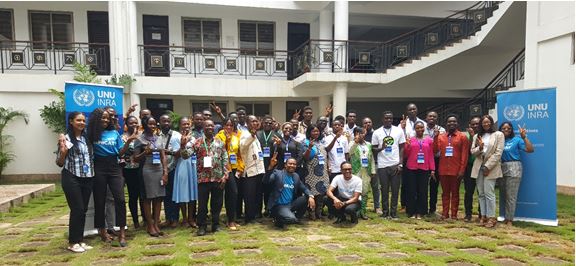By Buertey Francis BORYOR
The United Nations University-Institute for Natural Resources in Africa (UNU-INRA), through its Innovate for Clean Agricultural Technologies (INFoCAT) initiative, has commenced a 2-day capacity-building workshop for agriculture technology (AgriTech) innovators in Ghana.
The workshop – which is an integral part of the selection process for the INFoCAT Innovation Challenge – is designed to provide an enriching platform for knowledge-exchange, skills development and networking. Additionally, it is to explore and expand the role of clean agriculture technologies in driving sustainable development.
It is on the theme ‘Empowering Innovators: Strategies for Sustainable Agritech Solutions’ and includes interactive sessions, expert-led discussions and opportunities for participants to present and refine their innovative ideas.
The INFoCAT research and development project aims at leveraging innovative approaches to address critical issues in sustainable natural resource management and foster collaboration among researchers, policymakers and practitioners across Africa.
It also seeks to enhance women and youth economic empowerment in rural areas of selected communities in West Africa, while promoting low-cost clean energy-powered technology solutions that contribute to positively augmenting agricultural productivity and incomes for smallholder rural farmers.
INFoCAT Project Coordinator Dr. Ferdinand Tornyie, addressing media at the event said: “The project aims at empowering women in particular by providing them with funding support and mentorship, while also equipping them with the requisite knowledge and skills that enables them to design green technologies that solve women’s problems in agriculture.
“With respect to the INFoCAT Innovative Challenge, he indicated, “we are providing the applicants – also called green innovators – with the funds needed to design their technologies and go try them on their farms. A green innovator is someone who can design a machine that is powered by renewable energy and can solve agricultural problems.
“About 100 people have applied, but only 30 have been shortlisted to proceed to the next stage – where the best 10 among them will be selected based on their pitching performance. The competitor with best technology among the 10 will receive US$34,000 to scale up his or her business. But today being the opening session, it is devoted to building their capacity. Tomorrow is for practical work, and will witness the competitors pitch their technologies to experts in green technologies,” he added.
Meanwhile, UNU-INRA Director Dr. Fatima Denton – in a speech read on her behalf at the event’s opening session – emphasised that agriculture is the backbone of Africa’s economy, and its future lies in our ability to innovate and adapt to the pressing challenges of climate change, food security and environmental degradation.
“Clean agriculture technologies offer us the tools to not only address these challenges but also create new opportunities for growth, resilience and prosperity. However, the success of these technologies depends on the people who develop, implement and champion them – you, the green entrepreneurs,” she added.
Ensuring a gender-sensitive low-carbon development agenda is vital for fostering sustainable economic growth across sectors. The agricultural sector plays a significant role as smallholder farming has proven effective in reducing hunger and poverty among rural populations. Nevertheless, lack of access to clean energy poses a persistent challenge for smallholder rural agriculture production, post-harvest activities and agro-processing.
UNU-INRA is one of the 15 research and training centres of the United Nations University (UNU), focusing predominantly on Africa. It serves as a platform to amplify the continent’s voices and showcase made-in Africa solutions.
It also strengthens and develops capacities by equipping the continent’s researchers, entrepreneurs and policy-actors with the requisite knowledge to sustainably manage natural resources. It is implementing this project in partnership with its operating unit in Cote d’Ivoire and ENDA Energie in Senegal.
The workshop, starting from August 14 to 15, 2024 at the University of Ghana-Legon, covers essential topics such as: design thinking and ideation for agritech solutions; scaling innovations in clean energy agriculture; funding strategies and grant usage; and building collaborative partnerships.










